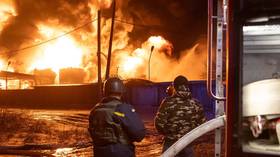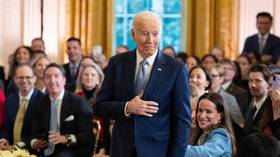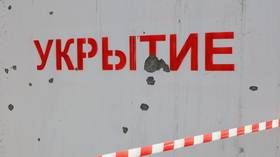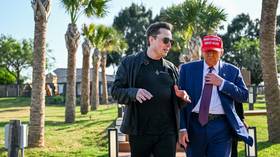Wednesday's Russian Press Review

The looming world financial crisis is prominent on the front pages as its impact on Russia is now inevitable. But the wheres and whens of it remain uncertain. In other headlines: South Ossetia is getting vast amounts of Russian aid, prompting some to say
ROSSIYSKAYA GAZETA, under the headline ‘A Model of Neighbourly Ties’, writes that relations between Russia and Azerbaijan remain friendly and the recent visit of President Ilkham Aliev to Moscow confirmed this. The paper writes that President Aliev met President Dmitry Medvedev to discuss a wide range of issues, including economic cooperation, energy and the situation in the Caucasus. The President of Azerbaijan expressed his concern over South Ossetia and Abkhazia. The paper says his Russian counterpart assured him that relations between the countries were not dependent on fluctuations in world politics.
TRUD says that at his meeting with the Russian President, Azerbaijani leader Ilkham Aliev confirmed that he is not going to get involved in a confrontation with Russia despite multiple attempts by Western powers to persuade him to do just that. The paper repeats a recent media rumour: at his meeting with Dick Cheney in Baku, and in response to Mr Cheney’s urgings, Aliev started talking about Georgia. He called Mikhail Saakashvili’s policies irresponsible and some stronger names. However, the paper says, the President of Azerbaijan has not yet voiced any criticism of Georgia officially.
KOMSOMOLSKAYA PRAVDA says in the global game of national interests, Baku is putting its money on Moscow. The paper goes on to quote the Azeri President Ilkham Aliev on the Caucasus: “Our region requires stability and predictability. That is what our relations with Russia provide to us: predictability.”
The daily also looks into the problems of Russia’s civil aviation. Under the headline ‘Why Russian airline companies are forced to shop abroad for used aircraft?’ the paper dedicates two full pages to a round-table-like discussion of the crash in Perm of an Aeroflot-Nord Boeing 737. One contribution suggests that high import tax on sophisticated spare parts used in Boeings and Airbuses prompts airlines to purchase cheaper replacements, and these often are of uncertain origin. Another says there are not enough new Russian airplanes for domestic routes, and they are built to order which makes the process slow. Apart from that, continues the article, for an airline it is often easier to buy a 15-year-old Boeing today and start operations tomorrow than to invest in a new Sukhoi Superjet and wait a year for delivery. There is also an interview with an official who oversees pilot training for the Russian government. He says, sometimes modern aircraft find themselves in sophisticated emergencies that are beyond the control of human crews. He takes an example of a crash that really happened. The information was then fed into a flight simulator to train pilots to deal with situations of exactly the same type. Several dozen crews were tasked to land the airplane one after another and, one after another, they all ended up in a virtual fatal “crash”.
IZVESTIA puts emphasis on the financial crisis beginning in the U.S, and its impact on Russia. The paper says, as it is impossible to predict the exact losses the Russian economy is going to take, it’s also impossible to estimate the approximates. However one thing is clear: Russia cannot avoid the impact because its economy is linked to every other economy in the world through globalized financial and industrial communication lines, but it has a better chance of surviving with minor damage than, say China, whose economy is much more interlinked with America.
VREMYA NOVOSTEI says the Russian financial sector has already entered the sharp phase of the crisis, and is ready to engage the financial ‘airbags’ built for it by the Russian government. However, notes the paper, the regular ‘airbags’ like Finance Ministry Auctions, may be good for huge commercial banks but they still leave medium-sized investment banks stripped of any armor against the crisis.
The same paper writes as soon as all necessary documents are signed in the Kremlin, South Ossetia will acquire a new status as Russia’s foreign partner. Relations between the two nations will have to change too: now they will be based on international law and diplomatic practice. Actually, says the paper, the new era will not begin before 2009. For now the main goal is to rebuild the republic’s economy, and that task is being performed at the moment by Russian organisations providing aid, such as the Ministry of Emergency Situations and regional Governor’s offices.
NEZAVISIMAYA GAZETA plainly calls South Ossetia ‘The South Ossetian Territory of the Russian Federation’. Under this headline the paper writes that as the whole relief effort in the region is now transferred from the Emergencies Ministry to the Ministry of Regional Development and its Minister Dmitry Kozak, who is ready to rebuild South Ossetia ‘with the same vigor he would show if he were tasked to rebuild something in a Federal territory.’
KRASNAYA ZVEZDA has a tribute to General Gennadi Troshev, a former commander of Russian Federal forces in Chechnya who died in the Boeing 737 crash in Perm on September 14. The article is in the form of a conversation with General Anatoly Kulikov, a former commanding officer and friend of Troshev. He says the late General was loved by his troops, first of all for the fact that he never hid behind their backs in combat and because, when planning operations, he always tried to cut down unnecessary casualties or avoid them altogether. The paper says, Gennadi Troshev, himself a son of a military officer, served out his career and became a full General. For his bravery and his victorious strategic decisions he was awarded the Golden Star of a Hero of Russia and multiple other decorations.
Evgeny Belenkiy, RT.











